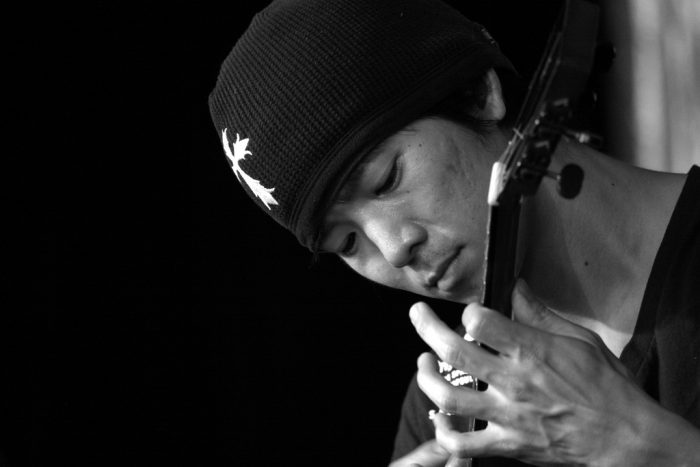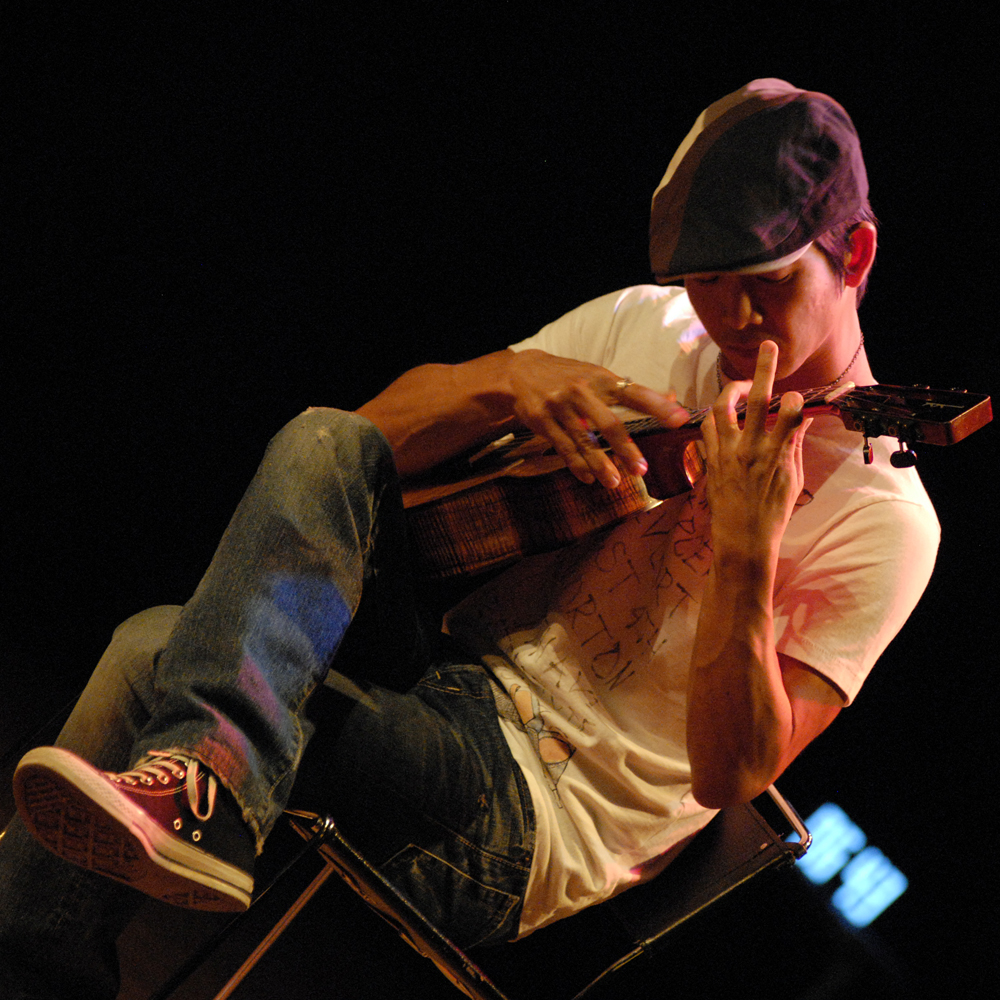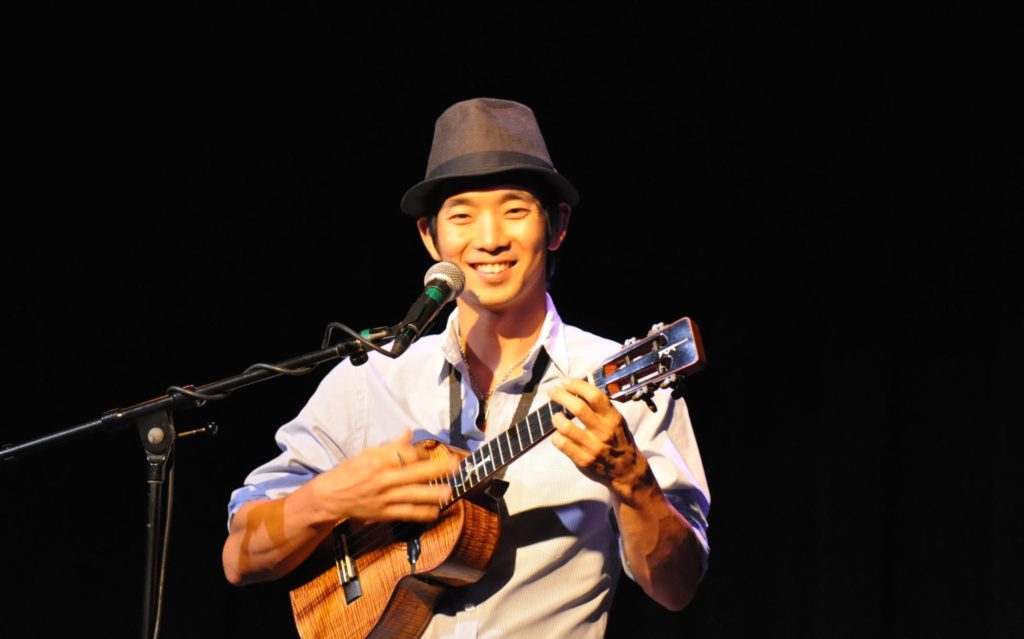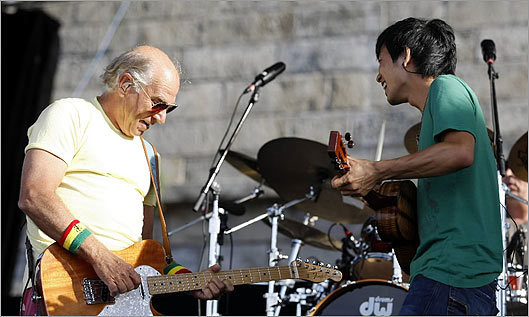
(photo by By Steve Ford – Own work)
By Steve Houk livingonmusic.com
You’d think that the man who basically reinvented both the playing of and worldwide appreciation for the ukelele in the late 20th/early 21st century would be at least a little high on himself and his monumental achievements.
Like anyone would, Jake Shimabukuro has to appreciate the astronomical status he’s risen to over the last 20 some years since he started playing the ukelele professionally, especially playing an instrument that one doesn’t necessarily associate with bigtime musical fame. Since then, there have been world tours with sold-out shows, dynamic collaborations with music superstars, and adoration and appreciation from his peers and fans alike. But in talking to him, his humble, candid and enthusiastic demeanor vividly conveys his genuine contentment in the joys of life that he is experiencing, as he continues to ride the towering wave of fame, an appropriate metaphor for a native Hawaiian.
“I am truly blessed with what is a wonderful balance in my life, between the music and my family,” the affable and eloquent Shimabukuro told me as he prepared for the next run on his current tour that will not only take him across the U.S. but also to Japan in the next few months, and includes a stop at the Birchmere on September 18th, which Jake calls “a real special place for me. It brings back special memories.”
“I have two amazing boys and an amazing wife,” he continued, “it’s like just kind of getting the best of both worlds, something that fulfills I think two pillars in your life that are so important: having purpose and a career but also family and being able to pass something on to your own flesh and blood.”

A fifth-generation Japanese-American, Shimabukuro’s overwhelming humility is not only refreshing, it is astonishing considering what he has attained in his career. Combining elements of jazz, blues, funk, rock, bluegrass, classical, folk, and flamenco, not only has he released thirteen critically acclaimed solo albums (as well as nine additional albums released only in Japan) as well as live DVDs, he has written soundtracks for films and TV, garnered prestigious music awards in both his home state of Hawaii and around the world, and there was an award-winning documentary released in 2012 about his life and career that has screened at festivals, aired on PBS and been released on DVD. Oh, and lest we forget the astounding version of George Harrison‘s “While My Guitar Gently Weeps” he played during an interview in Central Park in 2006 that went uber-viral and currently sits at over 16 million views and counting and propelled his already soaring career even further.

Handed the “ooo-ka-lay-lee” (as he pronounces it) by his uke-playing mama when he was four, Shimabukuro took to the small guitar-shaped instrument immediately, mainly because it felt like more of a joy than a task to play it.
“My Mom sat me down and handed me the ukelele, and I fell in love with it immediately,” Shimabukuro said. “It was never a chore, I thought of it as play not work. I think I was very fortunate that I found something early on that just captivated me and I just had this incredible passion for. It wasn’t that my parents made me play it, I wanted to play it. I’m so glad she took the time with me. And today even with my own kids, I also want them to appreciate playing music like I did, and not look at it as something they have to do, but something they want to do.”
Shimabukuro was a bonafide ukuleleist from that moment on and never looked back. He had his first taste of fame in his early twenties with the trio Pure Heart; he was working at a local music store in Honolulu when the group released its first record, which helped him amass his first string of awards and accolades that would come steadily during his four year stint with Pure Heart and then another band, Colón. After Colón disbanded, Shimabukuro decided to delve into education, another passion of his and would have stayed with that had he not been somewhat surprisingly signed to a Sony record deal in Japan, which really springboarded his career to the next level.
“Well, to be honest, it wasn’t really my choice. I mean, it wasn’t something that I thought, ‘I’m going to be a solo artist.’ When I actually parted ways with the two bands that I had been with, I honestly thought that was kind of the end of my performance, the performance part of music for me. And then what I did was I opened up a ukulele school, and I thought, “Oh, well, great. I’m just going to teach ukulele, and that’ll be something that I’ll just do,” because I love working with kids, and I love teaching people the ukulele. It’s a different aspect of music that I absolutely love. And I do miss it sometimes because I don’t get a lot of opportunities to do that now.”

“So I opened up the school in Hawaii, and I did that for about a year, and on the side, I was performing at a couple of restaurants in town. I would just sit in the corner and just play some instrumental music, and I was really just kind of practicing in the corner. And then the record deal came and that was it.”
Shimabukaro’s humility shines brightly when he is asked about his rapid ascension since that first record contract, he doesn’t credit anything but his love of the instrument and the joy it has brought him as the main reasons for his growth and maturity as an artist. And along with growing comes the urge to experiment and test the boundaries, which is what Shimabukuro dabbled with, but decided wasn’t working for him, at least not all the time.
“At one point I ended up doing a lot of experimentation, using effect pedals and the like, but then I was finding I was relying too heavily on it, and I started to feel like I had forgotten how to play naturally. When I decided to set aside some of that, I found doing that brought me back to where I needed and wanted to be, and back to what I felt at the beginning. And then I would say in the last three years again, I slowly started incorporating some of those effects again and some of those pedals, but now I feel like I’m using them in a very music way. I’m not dependent on them, but I think I’m more tasteful with it now than I was 10 years ago.”

For a while now, Shimabukuro has experienced musical collaboration most musicians only dream of, both playing live and recording with some of music’s biggest artists. His awareness was markedly increased among a new audience a few years back when he opened for Jimmy Buffett on three successive tours and is featured in several of Buffett’s videos and DVDs. Up next is an album of duets he did with what is a truly stunning collection of revered artists including Bette Midler (yes they did “The Rose”), Willie Nelson, Michael McDonald, Lyle Lovett, Vince Gill, Jon Anderson (who sang “A Day In The Life”) and Warren Haynes, with whom about their collaboration Jake said, “We ended up with a 14 minute song, and people were wondering if we should cut it down. And we were like, ‘No we’ve got to keep it all in!!’ “
Even at his level, Shimabukuro is full of awe when he sees young people playing the ukelele, something he didn’t see as much in years past, and some of that has to be attributed to his influence, although you won’t hear the humble Shimabukuro admit it.
“Oh yeah. I trip out now. Sometimes people will send me videos of these young kids playing. There’s this one kid from Japan who, man, he’s just shredding it. I think he’s not even 10-years-old or something like that. I’m just like, ‘Wow.’ There’s this one kid from China that has got just such great technique and such wonderful precision on the instrument. So I mean, when I see these young kids just doing that stuff, I’m just blown away like, ‘Wow, man. This is amazing.’ And they’re playing the ukulele, so it just blows my mind that the instrument has just come so far.”
Amidst what seems like a constant stream of glowing recognition and groundbreaking attention to him and his instrument, Jake Shimabukuro has relied on his own modesty coupled with his rare musical instincts, as well as the influence of others (he’s been called the Jimi Hendrix of the ukelele and admits a heavy homage to Hendrix) to build what is arguably the most illustrious ukelele career in music history. To watch him is to not only relish the music, but fall into his clear and present love of what he does. And there is no pretension to his success, only a deep appreciation of both his beloved “oo-ke-lay-lee” and what it has brought to his life, as well as the heritage he has reaped from growing up in Hawaii.
“I think living here has definitely been a huge part of why I play the way that I do today and why I feel the music a certain way. And honestly? I just love the way the ukelele sounds. I feel different when I play.”
Jake Shimabukuro performs Wednesday, September 18th at 7:30 pm at the Birchmere, 3701 Mount Vernon Avenue, Alexandria VA 22305. For tickets click here.
(Featured B & W photo with title by Steve Ford)




